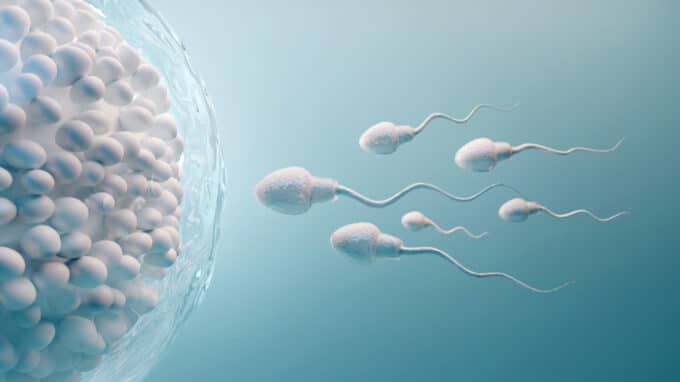Being overweight can lead to a number of health problems. In fact, obesity can also affect fertility. Research shows that men who have a higher BMI often struggle with poorer sperm quality as well.
Older Men With High BMI Have More Sperm Irregularities
Although it is well known that older men exhibit reduced reproductive health, little is known about testicular aging at the molecular and genomic levels. The aging process can result in a combination of modest molecular changes that sensitize the testicles to additional dysregulation, causing more pronounced dysregulation when aging is combined with additional factors such as obesity. To fill this gap, the researchers used single-cell RNA sequencing to profile more than 44,000 cells obtained from autopsy testicular samples from four young men and eight older men. The older donors were screened for having offspring as young adults to ensure fertility in early adulthood.
The young specimens showed no molecular signatures of aging or an impaired ability to produce sperm. Surprisingly, the older samples showed only modest age-related changes in stem cells that give rise to mature sperm, but were clearly divided into two distinct groups. The first group showed an intact ability to produce sperm cells, with only weak molecular signatures distinguishing them from young specimens. In contrast, the second group showed a very limited ability to develop sperm. Notably, BMI has emerged as a critical factor in older people. All donors in the first group had scores below 27, while all donors in the second group had scores above 30. Taken together, the results indicate possible molecular mechanisms underlying the complex age-related testicular changes and their possible aggravation by co-existing chronic diseases such as obesity.
Larger patient cohorts are required in the future to fully validate the results. Another avenue for future research is to investigate whether the testicular cells of older, stout males exhibit unique aging signatures, or if they simply exhibit accelerated aging. It’s also not clear whether diet, exercise, diabetes, or altered hormone production play a role in testicular aging. Additionally, determining at what age dysregulation of supporting testicular cells occurs, and if and how reversible it may be, may lead to improved medical advice for older men.
Weight Loss Means Twice as Many Sperm
In general, it can be said that sperm quality is declining worldwide. There may be good news for men who suffer from fertility problems and are overweight. In fact, obese men can double their sperm count if they lose and maintain the weight. In a recent clinical study, researchers from the University of Copenhagen and Hvidovre Hospital show that obese men have more sperm when they lose weight and maintain that weight loss. The new findings could be good news for men trying to conceive, as previous research has shown a link between higher sperm counts and achieving pregnancy faster.
A total of 56 overweight men aged 18 to 65 and with a body mass index between 32 and 43 took part in the study. It has long been known that obesity is associated with reduced semen quality. Studies in the past have associated weight loss with higher quality sperm, but they had so few participants or such modest weight loss that it was difficult to draw any conclusions. In the Copenhagen study, all participants first followed an eight-week regimen of a low-calorie diet, which resulted in weight loss. Then the participants were randomly divided into four groups.
Two of the groups received placebo drugs, while the other two groups received anti-obesity drugs. Among the two placebo groups, one group was required to complete an exercise program where they did at least 150 minutes of moderate exercise or 75 minutes of vigorous exercise — or a combination — each week. The other group did not change their normal level of physical activity. The two groups that received anti-obesity drugs were divided into a group with and a group without an exercise program in the same way.
After one year, the group that exercised only and did not receive any medication and the group that received only medication for obesity but did not exercise were shown to maintain their weight loss of 13 kg. The group that received anti-obesity medication and exercised lost extra weight and improved their health. The placebo group — those who believed they had received medication but did not exercise — had regained half the weight loss, with many of the risk factors associated with developing type 2 diabetes and cardiovascular disease worsening .





